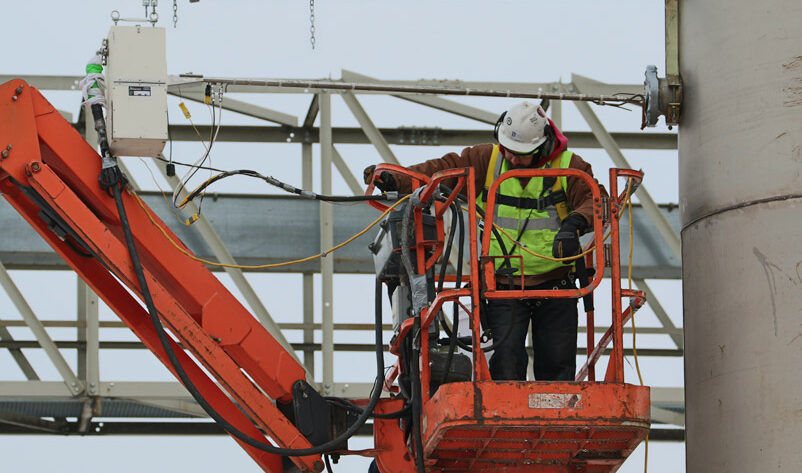Airborne Dust Concentration Test
In the oil and gas sector, the control of airborne dust is critical for maintaining both operational efficiency and worker safety. Airborne dust can lead to respiratory issues among workers and also affect equipment reliability and maintenance schedules. The Eurolab Airborne Dust Concentration Test ensures that facilities adhere to stringent environmental standards set by regulatory bodies such as the Occupational Safety and Health Administration (OSHA) and the International Organization for Standardization (ISO).
The test involves collecting samples of air from various locations within an oil or gas facility. These samples are then analyzed in our state-of-the-art laboratories using sophisticated analytical techniques to determine the concentration levels of particulate matter present in the air. This information is invaluable for identifying potential sources of dust and assessing compliance with emission limits.
For quality managers, this test provides crucial data on the effectiveness of existing dust control measures. Compliance officers can use it as part of their ongoing efforts to ensure regulatory adherence. R&D engineers benefit from understanding the impact of different operational conditions on dust generation. And procurement personnel can leverage this information when selecting suppliers who adhere to high environmental standards.
The Airborne Dust Concentration Test is a key component in maintaining a safe and efficient work environment at oil and gas facilities. By accurately measuring dust concentrations, it helps prevent incidents that could compromise safety or lead to costly downtime due to equipment failure.
Our testing process begins with the collection of air samples using specialized samplers designed to capture particles down to 1 micron in size. Samples are then sent back to our lab where they undergo rigorous analysis through gravimetric methods and optical particle counters (OPCs). The results provide detailed insights into dust levels across various areas of the facility, allowing for targeted interventions.
Regulatory compliance is paramount in this industry, making accurate measurement essential. Our laboratories follow internationally recognized standards such as ISO 14683:2019 which ensures consistency and reliability in our test results. These standards are crucial not only for meeting legal requirements but also for building trust with customers who expect sustainable practices from suppliers.
Understanding the composition of dust particles can help identify specific types of materials being processed, aiding in process optimization efforts aimed at reducing overall emissions. Additionally, this data supports decisions regarding necessary personal protective equipment (PPE) and ventilation systems designed to protect workers' health while minimizing environmental impacts.
The importance of accurate airborne dust concentration testing cannot be overstated given its direct implications for worker safety, operational efficiency, and environmental responsibility. At Eurolab, we take pride in providing comprehensive services tailored specifically towards meeting these challenges head-on with precision and integrity.
Why It Matters
The Airborne Dust Concentration Test is essential because it provides actionable intelligence about the presence of dust particles within an oil and gas facility. This information is vital for several reasons:
- Worker Safety: High levels of airborne dust can pose significant health risks, including respiratory problems and increased susceptibility to infections.
- Equipment Protection: Dust accumulation on machinery can lead to premature wear and tear, reducing equipment lifespan and increasing maintenance costs.
- Emission Control: Monitoring dust concentration helps facilities comply with strict environmental regulations and reduce their carbon footprint.
- OPEX Savings: By identifying sources of dust generation early, companies can implement targeted cleaning strategies to minimize operational disruptions and associated expenses.
In summary, the Airborne Dust Concentration Test serves as a critical tool for maintaining optimal working conditions within oil and gas operations by ensuring safety standards are met while promoting sustainable practices.
Eurolab Advantages
At Eurolab, we pride ourselves on delivering top-tier environmental testing services that exceed expectations. Here’s why choosing us for your Airborne Dust Concentration Test is the right decision:
- Accurate Measurements: Leveraging advanced analytical techniques and adhering to international standards ensures precise results.
- Rapid Turnaround: Our efficient processes allow for quick turnaround times, enabling prompt action on identified issues.
- Comprehensive Reporting: Detailed reports provide a clear understanding of dust levels across different areas of the facility.
- Expertise & Experience: Our team comprises highly skilled professionals with extensive experience in this field.
- Regulatory Compliance: By ensuring adherence to relevant regulations, we help protect your company from potential fines and penalties.
- Sustainability Focus: We understand the importance of minimizing environmental impact, making our services align perfectly with corporate sustainability goals.
Choose Eurolab for comprehensive Airborne Dust Concentration Testing – where precision meets reliability.
Why Choose This Test
The Airborne Dust Concentration Test is an indispensable service in the oil and gas industry due to its ability to provide critical insights into workplace conditions. Here are some compelling reasons why you should consider this test:
- Promotes Worker Safety: By identifying hazardous dust concentrations early, companies can take proactive measures to safeguard employee health.
- Enhances Operational Efficiency: Regular monitoring allows for timely intervention, preventing costly downtime caused by equipment failures related to dust accumulation.
- Aids Regulatory Compliance: Staying ahead of regulatory requirements helps avoid legal penalties and maintains a positive reputation among stakeholders.
- Supports Sustainability Initiatives: Understanding dust sources enables companies to adopt more environmentally friendly practices, contributing positively towards carbon reduction targets.
- Facilitates Continuous Improvement: Ongoing testing provides valuable feedback for refining processes continuously, leading to enhanced performance over time.
- Builds Customer Trust: Demonstrating commitment to maintaining high standards reassures clients about the reliability and integrity of your services.
The Airborne Dust Concentration Test is more than just a routine check; it’s an investment in long-term success for any oil and gas operation.





